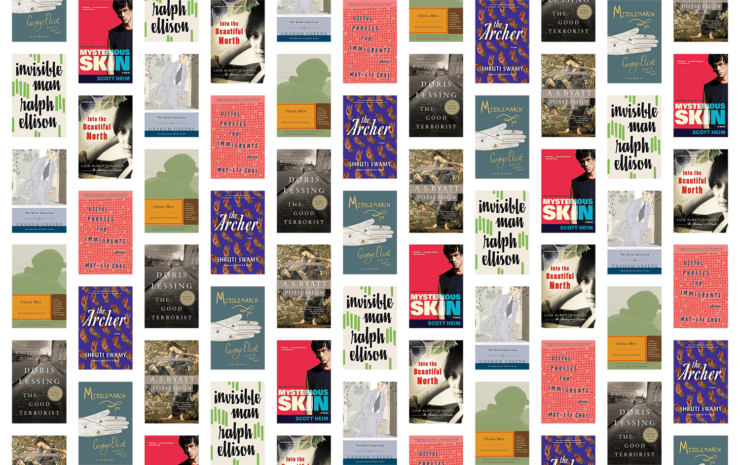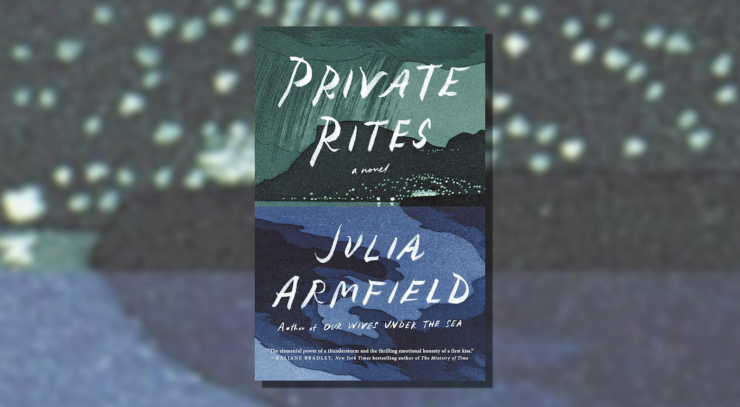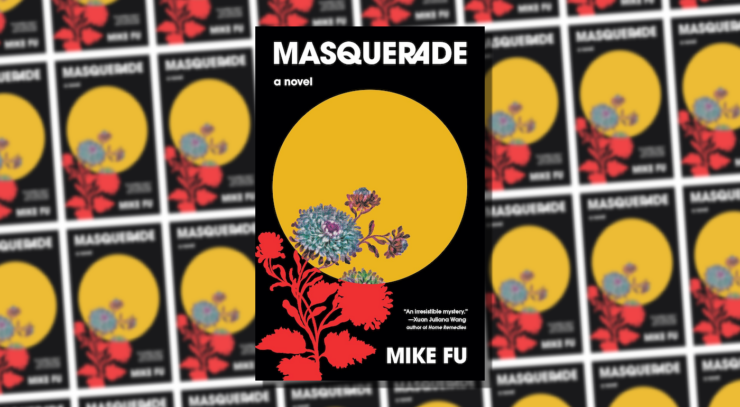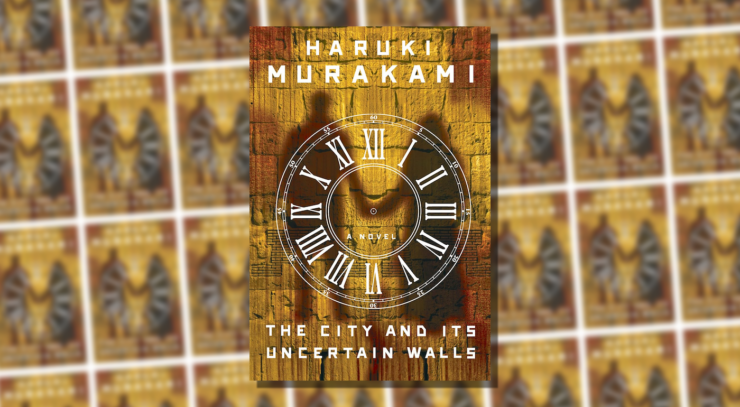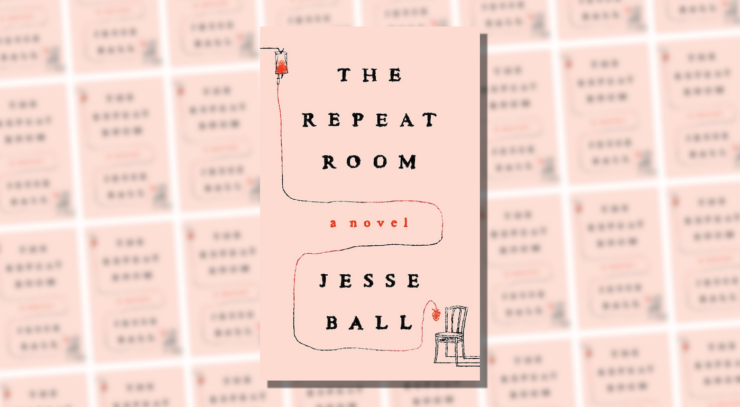I love literary fiction, whether it’s grand postmodern experiments or totally grounded personal stories about one family. I’ve been reading literary writing my whole life—I was an English major for two years before I jumped ship to Asian Studies in college. And I’ve learned a ton from writing literary fiction, contributing stories to places like Tin House, Conjunctions, ZYZZYVA, F(r)iction and the recent novel-in-stories Fourteen Days.
As I wrote a while back, the appearance of literary merit means people will give your work more of a chance in spite of weird experiments, but it also means the reader might pay a bit more attention to the nuts and bolts of the story (at least sometimes). In a good literary story, this relationship with the ideal reader leads to more attention to detail: in the sentence-level prose, but also the small details of people’s lives and inner states. I love a good literary novel for the same reason I loved Challengers, which I just finally watched: the main “widget” in the story is tennis, but the real driver of the narrative is the small stuff like Zendaya’s microaggressions and the endless homoeroticism between the two male leads.
Some years ago, author Curtis Chen was on a panel at an event I attended, and Curtis said that everyone who writes science fiction and fantasy should read romance novels. Romance novels teach you a lot about writing relationships and emotion, but also about building characters that people want to invest in for a whole story. I co-sign this recommendation, and especially recommend recent romances by Jasmine Guillory and Alyssa Cole. But I also feel the same way about literary fiction—it’s made me a better speculative fiction writer, and I highly recommend that aspiring SFF writers read some.
So here are ten literary books that made me a better science fiction author. (Note: This list doesn’t include my favorite lit fic with heavy science fiction or fantasy elements, which is a whole other list that I might post one of these days.)
Middlemarch by George Eliot
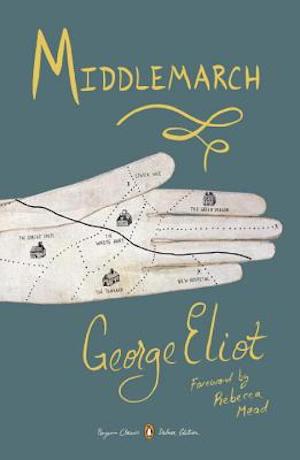
This is a novel I keep coming back to again and again. It’s the story of a small town facing the rise of industrialism, the brilliant young woman who thinks she’s married a serious scholar, the young doctor whose vain wife wrecks his dreams of making a difference in the world. I haven’t re-read Middlemarch in a decade, but what sticks in my mind is the strong sense of place, and the awareness of social upheaval. As Jo Walton wrote years ago, George Eliot saw the world transformed by the railroad, and Middlemarch is about a town that’s on the edge of a massive transformation with the passage of the democratizing Reform Act of 1832. Middlemarch’s characters struggle with how to use their privilege to do good, even as the nature of privilege is being somewhat revised.
Invisible Man by Ralph Ellison
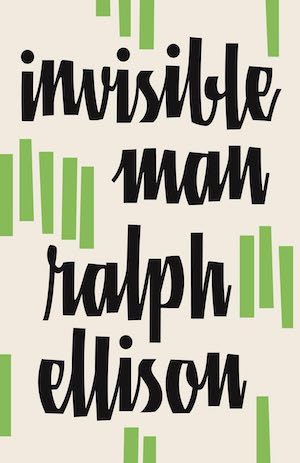
This is another book I haven’t re-read in too long—it’s true of several books on this list, alas—but it sticks in my mind. Like Middlemarch, Invisible Man is a novel about social upheaval—it ends with a vividly described protest—but instead of focusing on people in privileged positions who try to do good, it focuses on a nameless person living on the margins, whose experiences with both assimilation and radical politics regularly end in disaster. The protagonist tells his story from a hiding place underground, where he’s stolen electricity and is living out of sight, hence “invisible.” This remains a jarring metaphor for the ways that marginalized people are literally erased from the narrative.
The Quiet American by Graham Greene
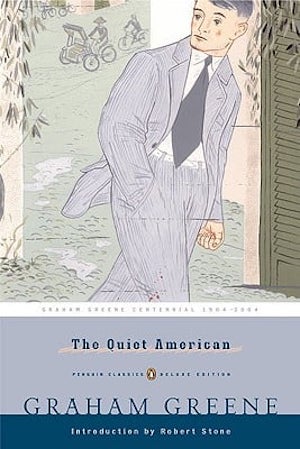
My biggest dilemma with this list was which Graham Greene novel to include, because Brighton Rock, Our Man in Havana, Travels With My Aunt, and A Burnt-Out Case also occupy a central place in my personal canon. A former spy for MI-6, Greene was incredible at writing about the utter cluenessness of Englishmen (and Americans) abroad, and the chaos that happens when we try to meddle in other countries’ affairs. His wry sensibility and crisp prose left an indelible impression on me. But I feel like The Quiet American had the biggest impact, in part because Greene does such a wonderful job of capturing the arrogance and selfishness of Americans living in Asia, something I’ve also witnessed up close. The American of the book’s title is a young CIA agent in 1950s Vietnam, who believes it’ll be easy for the USA to effect regime change there—but a lot of the action of the book involves a young Vietnamese woman who hooks up with him and falls prey to the power dynamics inherent in their situation. This book was also made into a fantastic movie that had the misfortune to be made around the time of 9/11.
China Men by Maxine Hong Kingston
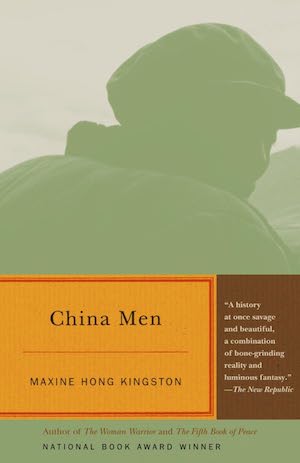
I read this book when I was living in China, so its portrayals of Chinese immigrants surviving in the USA hit home in an unusual way for me. But Kingston’s writing hits home regardless, with a grittiness that sticks in your mind. (Literally, for years when I ate dumplings I thought about the bit in this book where a character says that when you eat dumplings, you’re eating the dirt from the fingernails of the women who kneaded the dough endlessly.) This book has some fantastical parts, including an opening fairy tale about a man who discovers the land of women (which reads a bit essentialist nowadays) and later tales about ghosts and goddesses—so it’s a bit of a departure from the focus on realist fiction in this list. But the stuff I remember from it is just the small details of Chinese people—mostly men, as the title suggests—trying to make sense of life in the bewildering alien land of America.
The Good Terrorist by Doris Lessing
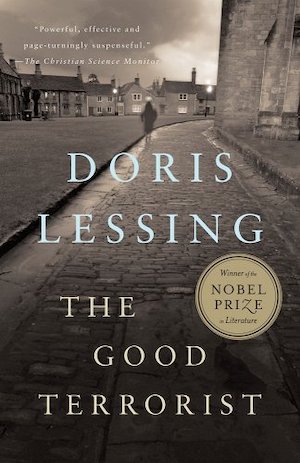
Lessing’s best-known work is the introspective, kaleidoscopic The Golden Notebook, which did indeed blow my tiny mind when I first read it. Lessing also wrote some science fiction, and blended SF with realism in a way that I’ve never seen anyone else do. But her biggest influence on me is this lesser-known novel about a young woman who winds up living in a house full of radical activists who want to bomb something but are just too clueless to pull it off. Lessing was heavily involved in radical Communist politics for years her Martha Quest novels capture brilliantly the disillusionment of young Communists who slowly realize that Stalin is not the hero they thought he was—and here she writes a small-scale novel about idealists who are led astray by their desperate need to make a mark on the world. The protagonist, Alice, is the quiet person who cooks and cleans and basically keeps everyone else going without any credit.
Possession by A.S. Byatt
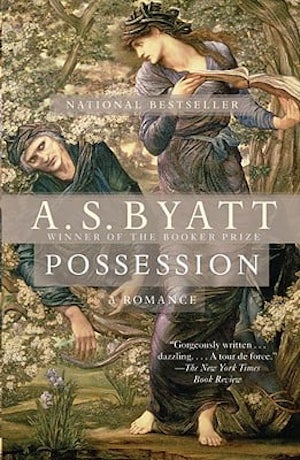
I re-read this book just a few months ago, because my upcoming novel Lessons in Magic and Disaster has a similar literary detective story at its heart. And when I think about the current vogue for Dark Academia stories, Possession feels like a foundational text to me. The story of two young scholars who stumble upon a long-lost letter that hints at a secret affair between two Victorian poets, Possession fairly burns with the joy of discovery and textual analysis. That’s the thing that I really discovered when I re-read this book: the poetry of Randolph Henry Ash and Christabel LaMotte is vitally important to the story and to their love affair, and the “clues” in the story are as much about the beauty of their writing and metaphors as any love letters. I’ll probably be writing more about Possession as the release date of Lessons in Magic and Disaster grows closer, so stay tuned.
Mysterious Skin by Scott Heim
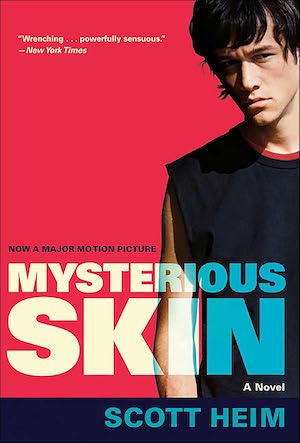
Here’s a book that teases science fictional stuff, but is ultimately pure realism. A young man named Brian believes he was abducted by aliens, but his former classmate Neil helps him confront the truth—which is more mundane but also more horrifying. As an examination of abuse and the trauma it leaves behind, this book pulls absolutely no punches, but Heim also creates two vivid characters in Brian and Neil. This book was a huge influence on my early writing, because it’s unapologetically queer and handles its self-destructive, damaged characters with immense tenderness. I’ve seen Mysterious Skin adapted as a stage play, and it was also turned into a brilliant film, and it’s fascinating to see how different people approach this book’s challenging structure and the reveal of what really happened to Brian and Neil.
Into the Beautiful North by Luis Alberto Urrea
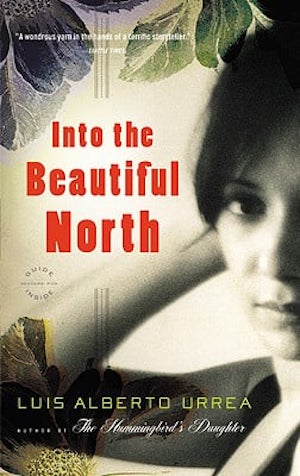
In a small town in Mexico, all the men have gone north to the United States to find work—so a young woman named Nayeli and her friends decide to go looking for seven dudes to protect their town from bandits. (Basically inspired by Seven Samurai, by way of The Magnificent Seven.) This was my introduction to Urrea’s writing, and his humor and sharp characterization blew me away. Urrea writes about Mexican migrant workers with a sensitivity and lightness of touch that feels especially needed right now, and shows how migration affects people in Mexico as well as the United States. Nayeli and her friends journeying to the US reminds me a lot of the final season of Reservation Dogs, to the point where I kept wondering if this book might have been as much an influence on that show as it was on me.
Useful Phrases for Immigrants by May-lee Chai
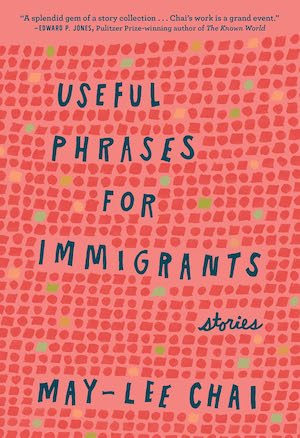
And now, a short story collection! As the name suggests, these are stories about immigrants, mostly but not entirely Chinese people living in the United States, and it pairs well with Kingston’s China Men. But some of my favorite stories in this book actually involve immigrants from one part of China to another, like the boy from the countryside who works in a scuzzy fish restaurant in the big city. Chai also has a very keen sense of the slow heartbreak of broken families, and the clash between traditional values and the challenges of 21st-century life. The title of this collection probably gives you a pretty good idea of how sarcastic and wistful Chai’s writing is, too. It’s a show-stopping performance.
The Archer by Shruti Swamy
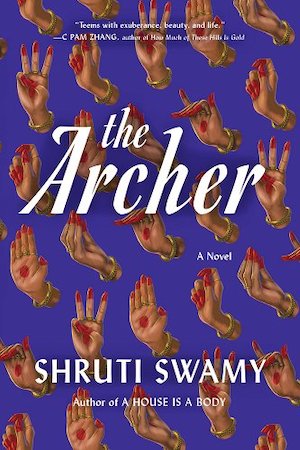
Swamy also wrote one of my favorite short story collections of recent years, A House Is a Body, which contains a decent amount of fantastical stuff. (There’s a story about a woman who has a relationship with the god Krishna, for example.) The Archer, meanwhile, is an entirely realist novel about a young woman from a poor family who studies dance and goes to university in 1960s and 1970s Mumbai. Vidya ultimately has to choose between the woman she loves and a man who offers stability, with her ability to keep performing the challenging Kathak dance also hanging in the balance. Like a lot of these novels, The Archer is about the sacrifices we make, but also the mistakes. Without giving anything away, there’s a POV shift fairly early on in the book that utterly wrecked me, and I’m still in awe of Swamy’s ability to pull it off.
This article was originally published at Happy Dancing, Charlie Jane Anders’ newsletter, available on Buttondown.










